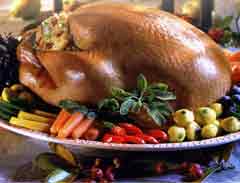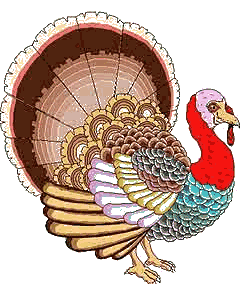Turkey tradition

The wild turkey is native to northern Mexico and the eastern United
States. Later it was domesticated in Mexico, and was brought into Europe
early in the 16th century.
Since that time, turkeys have been extensively raised because of the
excellent quality of their meat and eggs.
Some of the common breeds of turkey in the United States are the Bronze,
Narragansett, White Holland, and Bourbon Red.
"The turkey is a much more
respectable Bird and withal a true original Native of North America".
Remarked Benjamin Franklin, the scientist cum statesman, who was in favor
of making Turkey the national Bird, instead of Bald Eagle. |
 |
Though there is no real evidence
that turkey was served at the Pilgrim's first thanksgiving, but through
ages it became an indispensable part of the Thanksgiving tradition. The
tradition of turkey is rooted in the 'History Of Plymouth Plantation',
written by William Bradford some 22 years after the actual
celebration.
In his letter sent to England Edward Winslow, another Pilgrim, describes
how the governor sent "four men out fowling" and they returned
with turkeys, ducks and geese.
Unfortunately the Bradford document was lost after being taken away by the
British during the War of Independence. Later it was rediscovered in 1854.
And since then turkey turned out to be a popular symbol of the
Thanksgiving Day. And today of all the the Thanksgiving symbols it has
become the most well known. |
The turkey has brown features with
buff-colored feathers on the tips of the wing and on the tail.
The male turkey is called a 'tom'. It is bigger and brighter
with more colorful plumage. Also it has a long wattle (a fleshy,
wrinkled, brightly colored fold of skin hanging from the neck
or throat) at the base of its bill and additional wattles
on the neck, as well as a prominent tuft of bristles resembling
a beard projecting downward from its chest. The female is called
a 'hen' and is generally smaller and drab in color.
Click Here for turkey recipes |
 |
|
|

